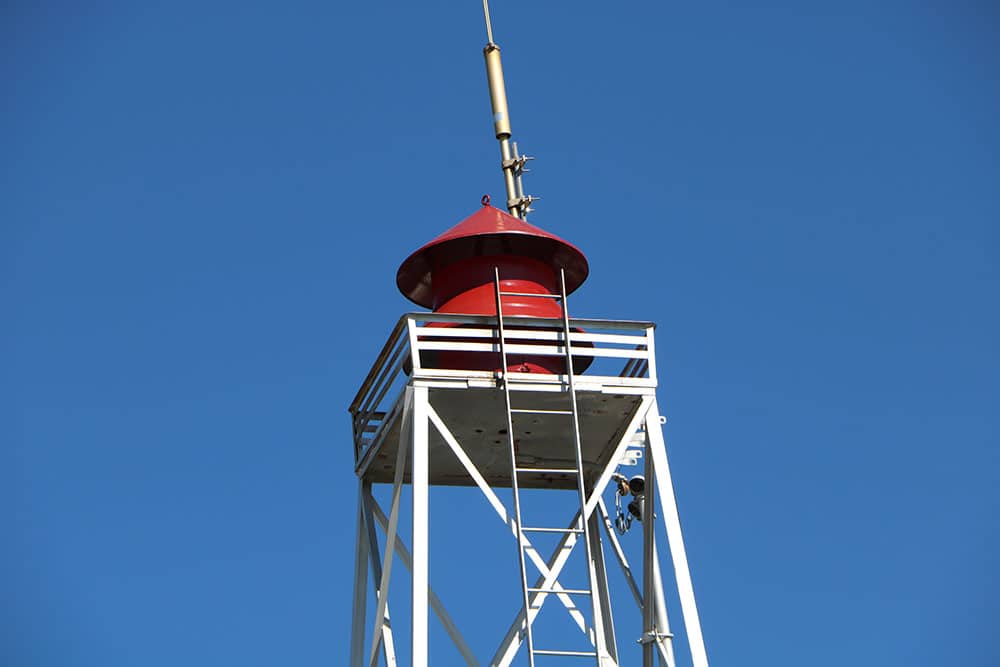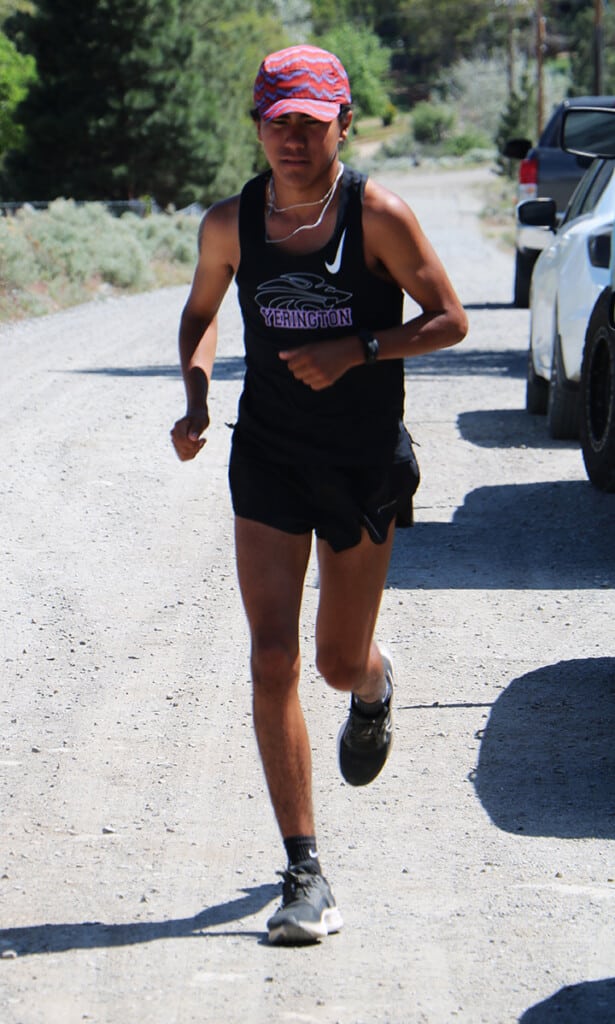
As Minden sounded its siren at noon on May 28, a group of more than 50 Washoe and their allies shouted together in response, “Stop the siren!” Their defiant cry and a formidable eight-mile group run followed an hour-long protest of the Nevada town’s daily siren blasts.
Minden has sounded a siren each evening nearly continuously since 1921, while Douglas County required Indigenous and other people of color to leave town at sundown until 1974. While town leaders claim the siren’s continued use honors the volunteer fire department and first responders, Washoe and their supporters regard it as a painful reminder of former racist practices.
“I’m here because of stories that my grandma would share with me, and all our other elders. I picture them scurrying away from town when the siren did go off. People are still alive today that would have to leave town,” said Washoe descendant Stacey Burns.
Washoe, other Indigenous people, and allies from Nevada and neighboring states spoke movingly at the Minden Park gathering within view of the siren atop the fire department.
Then the group reassembled on Snowshoe Lane in nearby Genoa for a hilly run through Humboldt-Toiyabe National Forest. Leading the pack was Paiute descendant Ku Stevens, Nevada’s top young distance runner and four-time high school state champion, who observed that “actions speak louder than words.”

Stevens’ actions included leading about 25 runners on a challenging course that started at 5,000 feet in elevation and climbed 1,500 feet more through a forest loop. The pack varied in age from pre-teens to mid-50s and made several stops along the way to regroup and rest. Most runners finished in two hours or more, thirsty and spent. But Stevens cruised through an easy workout, even adding extra distance at the end to keep up with his training schedule.
“It was nice having people to run with behind me, to hear their footsteps, to know that they’re here for the same reason I’m here. In a way, that was special,” Stevens said. “Hopefully people will listen to the meaning behind the run.”
Nevada banned sundown sirens in 2021, though Minden officials claim the law does not apply to their siren because it honors first responders under the town’s 2007 retroactive ordinance.

Following the state law’s passage, Minden town manager JD Frisby and Washoe Tribe chairman Serrell Smokey reached an agreement to change the evening siren from 6 p.m. to 5 p.m. They issued a joint statement that the change would “acknowledge the volunteer firefighters and first responders who have been historically dispatched by the town siren” and “honor those hurt by archaic sundowner mandates of prior eras.”
However, other Washoe disapproved of the agreement and Smokey’s choice to make it without consulting other tribal officials.
“I know the trauma that people live in every day in our community. The thing that keeps trauma going is the reminders of trauma that trigger us. That siren every day is that trigger for our community. It’s the thing that keeps the injury going,” said Art Martinez, a Chumash.
“The Minden sundown siren belongs in a museum where the true history can be told,” said Matt Niswonger, editor of Adventure Sports Journal. Niswonger and Washoe descendants Marty Meeden and Paula Smith organized the event.

When a park sprinkler activated just as the protest began, the group had to suddenly move to a different spot. That new location afforded Meeden a view of the alley behind the downtown businesses.
“That’s when the impact really hit me,” Medeen said. “That’s where these atrocities would take place. People would be threatened with arrest, beaten, and taunted. They couldn’t be on the main street and had to take refuge on that alleyway. I wondered how many people had to hide or seek refuge back in there.”
Prior protests have drawn a small number of siren supporters though none appeared or spoke at the Minden Park event. Frisby did not respond to a request for comment.
However, the runners were surprised to encounter a siren defender on their course. “We’re trying to shut down the siren, it represents a lot of bad things,” Stevens told him. In response, the man said he considered the issue “a small problem compared to the real world,” and encouraged the runners to “live in the now.”
The man’s comments felt like “a slap in the face,” Stevens said.
“People think that racism and history and all of it has been taught and learned and digested already, and that everybody is over it, but people like that show that it’s not,” Stevens said. “These kinds of events are needed for people to interact and connect with other people who feel differently than them.”
Though just 18 years old, Ku has already taken action to educate the public about Indigenous issues by highlighting the life of his great-grandfather. Government officials forced Indigenous children like Ku’s great-grandfather Frank Quinn, to leave their homes for distant boarding schools in the early 1900s. Only eight years old, Quinn escaped Stewart Indian School by running 50 miles through the desert back to his Paiute reservation home, not once but three times.

To honor his great-grandfather, Stevens organized a Remembrance Run along the same 50-mile route in 2021 and plans to repeat the event twice more to match Quinn’s three runs to freedom. He noted that Indigenous issues like the siren, boarding schools, and missing people all interlink.
After the May 28 run, weary siren opponents rehydrated, congratulated each other and vowed to meet again next year. Shortly after they dispersed, the Minden siren sounded again at 5 p.m.
“We have a long ways to go,” Stevens said.
Matt Johanson enjoys exploring and writing about the outdoors. Climbing Mount Shasta, hiking the John Muir Trail, and skiing through Yosemite’s high country rank among his favorite outings. Matt’s books include California Summits, Sierra Summits, Yosemite Adventures, and Yosemite Epics. He’s taught and advised an award-winning high school journalism program for more than 20 years.
Founded in 2020, the Sierra Nevada Ally is a self-reliant 501c3 nonprofit publication with no paywall, a member of the Institute for Nonprofit News, offering unique, differentiated reporting, factual news, and explanatory journalism on the environment, conservation, and public policy, while giving voice to writers, filmmakers, visual artists, and performers. We rely on the generosity of our readers and aligned partners.
Republish our stories for free, under a Creative Commons license.


